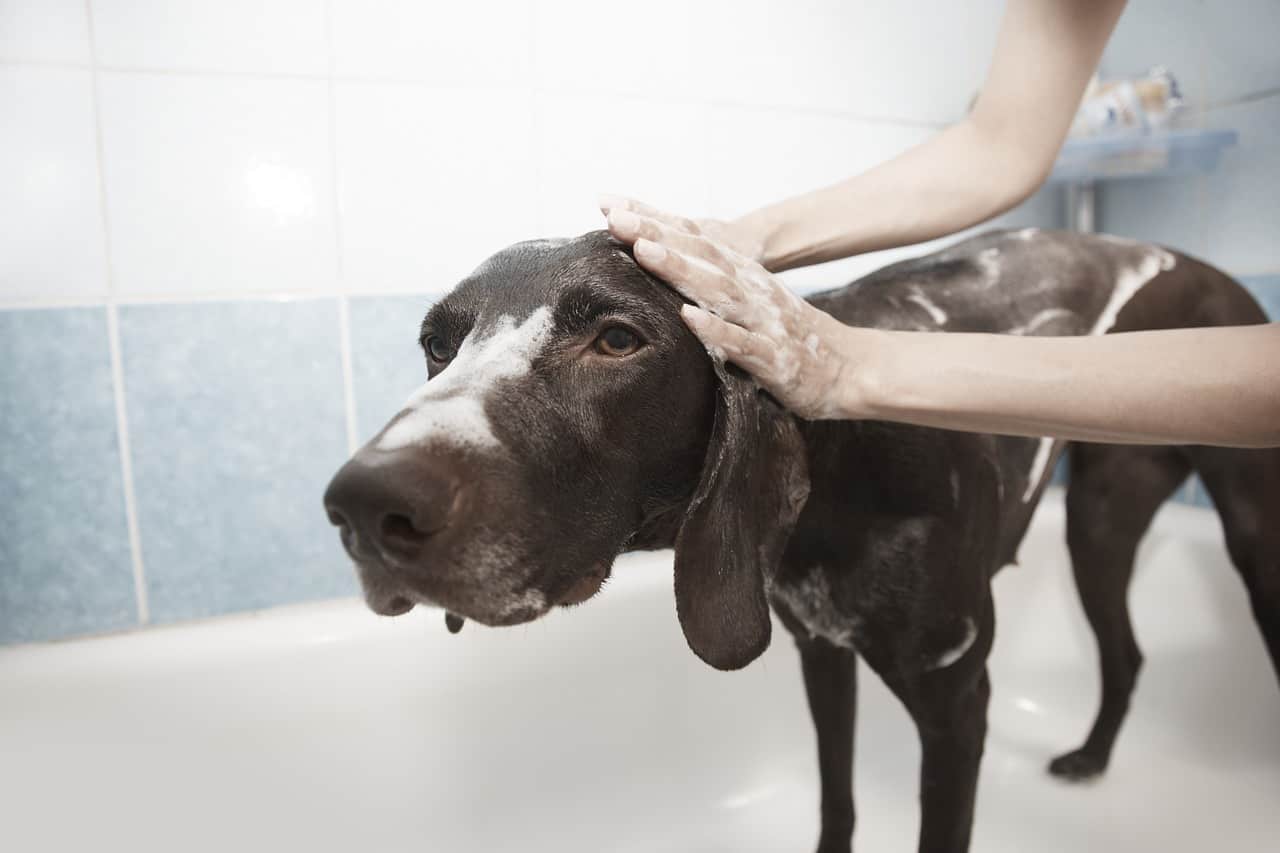Having a pet sprayed by a skunk has happened to a lot of people. Here is what you can do right now to get rid of that smell. The best solution for getting skunk spray is a mixture of:
- 32 oz (1 quart) of 3% Hydrogen Peroxide,
- 1/4 cup of Baking Soda
- 2 Tablespoons of dish soap, like Dawn.
Mix these ingredients together until all or most of the baking soda is dissolved, if you keep an empty plastic gallon or half-gallon size milk container around you can quickly mix the ingredients and shake it dissolve the baking soda. And then the bottle makes it easy to pour it onto your dog. Using a soft hairbrush can help cover all of the areas of fur that have been sprayed. After washing with a solution, rinse with plenty of clean water. If you still can’t smell the skunk odor, you can repeat this process.
It seems that a lot of dogs get sprayed in the face as they are chasing after a skunk or barking at one that is cornered. It is very important not to get the soap and hydrogen peroxide solution in your pet’s eyes. It seems like the dog has skunk spray in its eyes, the best thing to do is rinse your dog’s eyes with a large amount of water. It’s not a bad idea to keep a bottle of sterile eyewash solution on hand for any kind of eye emergency, there are different options such as this one on Amazon. These eyewash solutions will stay good and ready to use for quite a long time.
The hydrogen peroxide that you’re going to use does however lose its potency over time. Exposure to light will break down the hydrogen peroxide leaving you with nothing but water. If you store your bottle inside of the cabinet, an unopened bottle be good for six months to year. Once a bottle of hydrogen peroxide is opened it will start to degrade more quickly. This also means that you shouldn’t make up this mixture and store it in case of emergency. After a few hours to a few days it would just be soapy water, the peroxide would have been all reacted.
IMPORTANT – the hydrogen peroxide that you want to use for your pet or for personal use is a 3% solution. In chemistry labs and haircare salons you may find stronger solutions of hydrogen peroxide that can go all the way up to 30%. These are strong oxidizers and can cause real damage. Don’t ever use anything stronger than the hydrogen peroxide you buy in your grocery store or pharmacy!
Once you have your dog cleaned up, you can use any remaining hydrogen peroxide and soap solution to clean spots that the dog may have touched and transferred skunk spray to. The solution will work fine on doors and walls. Use caution however on applying to any carpet or cloth to make sure that the peroxide doesn’t cause a discoloration.
The hydrogen peroxide in the solution will react with the thiols and thiol acetates in the skunk spray, that make it so pungent, and oxidize those to produce sulfonic acids. A sulfonic acid doesn’t have an odor, and if you look on a bottle of shampoo and see an ingredient with the name sulfonate in it, you’ll see that the peroxide solution is not producing something that will not cause harm to your pet, but a water-soluble compound that can be washed away.
Other remedies like tomato juice, or vinegar really don’t have the same ability to treat the skunk spray directly. They may dilute or cover the smell in part, but in the long run they are not as effective as the hydrogen peroxide solution. There are also some products that contain enzymes or solutions which can break down some of the chemicals in the skunk spray, but these seem to do a better job when they have more time to interact with the spray before being rinsed off so these could be an option for cleaning carpet or furniture if you are concerned about bleaching fabric with the peroxide.

